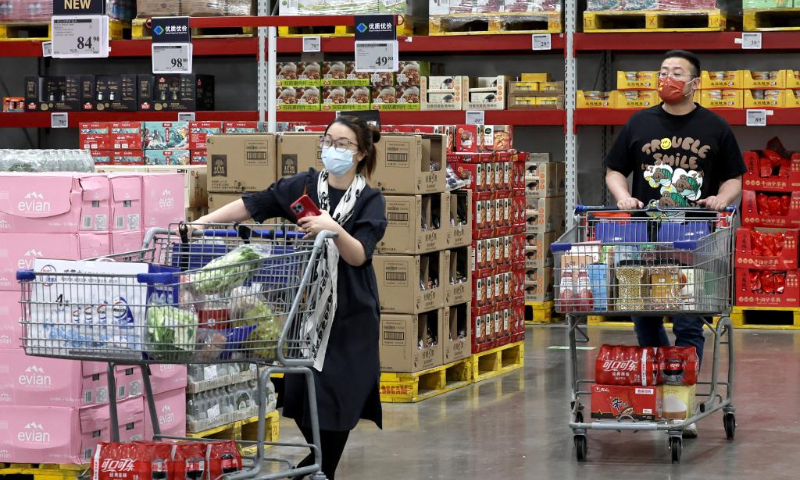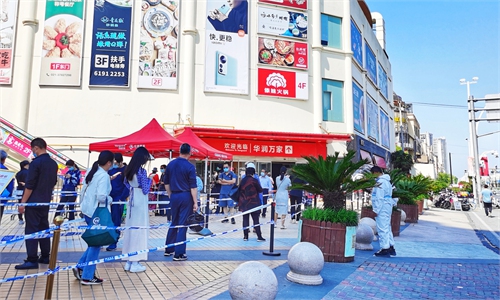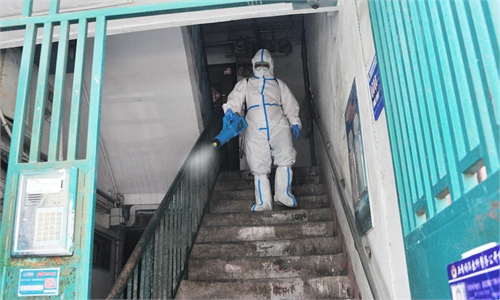
Customers shop at a Sam's Club warehouse store at Beicai Town in Pudong New Area, Shanghai, May 2, 2022. Large retail companies in Shanghai have started to reopen their supermarkets amid the recent COVID-19 resurgence. Xinhua/Chen Jianli
Vice mayor of Shanghai announced on Monday that no new COVID-19 cases were detected outside quarantined areas for two consecutive days, while the number of daily new positive cases has dropped to less than 1,000 for the first time since the beginning of the Omicron outbreak.
Among all the 16 districts in Shanghai, 15 of them have reported no new community-transmitted positive cases, with less than 1 million residents restricted to lockdown-level areas, Zong Ming, the city's vice mayor said at Monday's press briefing.
The epidemic has been effectively controlled and the prevention and control measures have gradually achieved positive results, Zong said.
Zong also stressed that there are still positive cases reported in centralized quarantine areas and old residential communities under lockdown. "A risk of a relapse still exists," Zong noted. "It requires continuous efforts and the support and cooperation of citizens."
On Sunday, Shanghai reported 69 locally transmitted COVID-19 cases, and 869 local asymptomatic infections. On Monday, the Shanghai health commission specified that all of them were detected within areas under quarantine.
Lu Hongzhou, head of the Third People's Hospital of Shenzhen, told the Global Times on Monday that the number of new positive cases has dropped to less than 1,000 for the first time since the outbreak, which shows the effectiveness of the city's efforts in fighting against the epidemic.
Shanghai will restart social activities gradually, and will resume normal life and activities from June 1 to mid- or late-June under epidemic prevention and control management, according to Zong.
From now on to May 21, the city aims to reduce the number of residents under "lockdown" and allow residents who are under "prevention-level" to move within limited areas in an orderly manner.
From May 22 to 31, the emergency preventive and control management will speed up to shift into regular management.
Shanghai has fully prepared and could reach the goal based on the current hard-won results, Lu said, noting that an orderly resumption will be helpful to increase residents' confidence and ease their negative feelings.
About 19 million residents have been put under the "prevention-level" regions and 980,000 residents are under "lockdown" level, according to the authorities on Monday.
In "prevention-level" areas, residents should soon be allowed to move freely and normal social activities should be restarted as soon as possible, Lu said.
Lu noted that residents need to scan the location QR code before entering public venues such as restaurants and coffee shops or taking public transportation to show a negative nucleic acid result they have obtained within 24 or 48 hours, so as to quickly detect any possible virus carrier.
For those people who have a high-frequency social contact, such as medical staff and delivery couriers, they should take nucleic acid tests once a day, Lu said.
As of Sunday, there were 261 severe cases and 65 critical cases being treated in hospitals, Wu Jinglei, director of Shanghai's health commission said at Monday's press briefing. The city reported four more COVID-19-related deaths on Sunday, characterized by a patients' age average of 86.5, and by the presence of preexisting conditions in all patients, Wu noted.
Among the four patients, one didn't receive COVID-19 vaccines and their direct causes of deaths are underlying diseases or cancers, according to Wu.
From Monday, taxis and private cars will be able to move within non-central urban areas that have reported no new community transmission cases, such as the Jinshan and Fengxian districts and part of the Pudong New Area as well, said the authorities on Monday. From May 22, buses and rail transit will also resume operations gradually and under specific conditions.
Airlines will also gradually resume domestic flights arriving at the city, according to the authorities.


